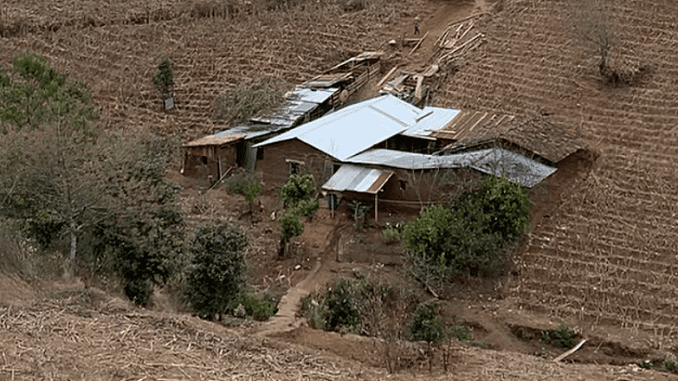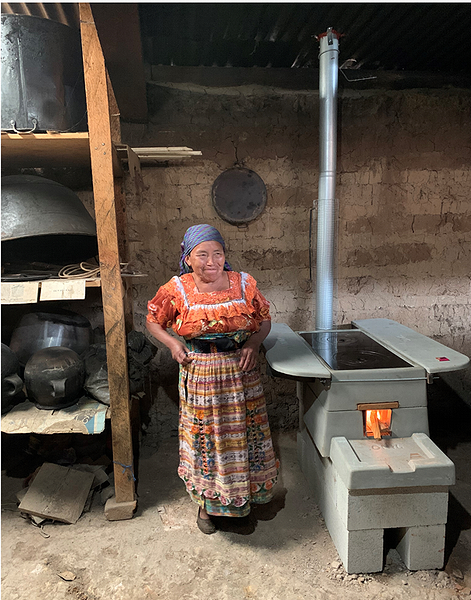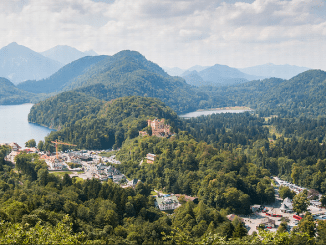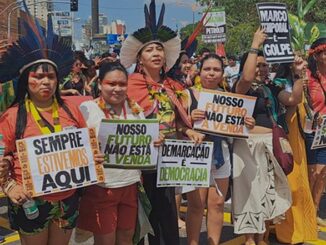
By Benjamin Seidman
SANTA CRUZ DEL QUICHE, Guatemala, April 21, 2022 (ENS) – “Before, it wasted a lot of firewood and it’s very expensive. We don’t have jobs to get our wood,” a mother in the rural village of San Pedro II in the highlands of Guatemala explained to me.
I recently worked installing stoves and water filters on a mission trip with Cascade Medical Team, an Oregon non-profit organization affiliated with HELPS International focused on serving the indigenous population of Guatemala. The stoves and water filters we installed will help mitigate deforestation, improve human health, and allow greater freedom for women.
After a half-hour trek down a valley of extensive corn fields dotted with isolated stands of pines, we crossed a rotting bridge over a small ravine and reached the woman’s house. The home is adobe with a dirt floor, constructed for a large family, its terra cotta tile roofing bleached by the harsh sun. The small adobe kitchen building stands adjacent to the pig sty and hen house.
The mother was kneeling on the ground cooking atol, a thick drink made of tortilla dough and water boiled together over a three-stone fire, a cooking technique that remains the status quo in many parts of the world, but one that is detrimental to human health, safety, and the environment.
She graciously offered us some atol in a show of hospitality, while four little boys peered anxiously at us through a crack in the poorly joined wood slats which formed the wall.
Cooking over an open fire has many adverse impacts on health. Constant exposure to smoke is harmful to the eyes while smoke inhalation damages the pulmonary system. For children under the age of five, acute respiratory infection is the leading cause of death.
Places where open fires are still used also have high rates of burns, an issue especially affecting infants and children. It wasn’t uncommon to see people with clear evidence of burns from long ago that had never healed properly.
These open fires are also far less efficient, requiring more wood and more time to cook meals. Women are often expected to drop out of school early to gather firewood or help their mothers cook and care for their siblings.
The school we visited in a nearby village to install an industrial stove and eight water filters had a separate classroom for first, second, and third grades. But the school had just a single combined classroom for fourth through sixth grades, as many girls in the community won’t stay in school for more than a few years.
Fuel efficient stoves save “women two days a week in time because of the wood savings and efficiency of the stoves,” according to Judie Tarlow, the facilitator for community development projects who sits on the board of directors for Cascade Medical Team.
According to Developing World Connections, one ton of firewood is used per person annually, while the majority of Guatemalans remain dependent on open fires to cook. Reducing wood use serves to reduce deforestation in Guatemala, which has become a massive issue.
Logging, forest fires, and agriculture are the main causes of the deforestation in Guatemala, and it has been difficult to identify any one effective solution. Illegal logging is a major problem, because many rural indigenous people live off the land, convert forests into crop lands and cattle pastures, and cut down trees for firewood.
Guatemala has seen some of the highest rates of deforestation in the Americas, a 19 percent decrease in tree cover since 2000, according to Ecosphere, a London-based business that sells forest carbon credits.

The ONIL stoves we installed save 70 percent of the firewood needed compared to a classic open fire, which means less time, money, and forest resources poured into cooking, a critical step for this poverty-stricken region.
The ONIL is a cookstove developed by HELPS International with assistance from Dallas, Texas engineer Don O’Neil. The stove has a chimney and a rocket elbow combustion chamber. Two steel hot plates fit into the ceramic top plate, with concentric removable rings to heat pots directly.
HELPS uses local enterprises to produce the stoves; all components are manufactured within about 100 km (60 miles) of Guatemala City.
The ONIL stoves that the Cascade Medical Team has been installing in Guatemala since 2005 have received the Ashden Award for sustainable energy and development from the London-based charitable organization.
The Ashden judges granted HELPS the award in 2004, saying, “By bringing this sophisticated fuel-efficient stove into the homes of Guatemala’s rural poor, HELPS is leading the way in the fight against crippling respiratory disease and horrifying burns, while also helping conserve the country’s dwindling forest.”
The Cascade Medical Team also installed water filtration systems to help to provide safe drinking water to families who often lack access to pure, sanitary water.
These people suffer from a wide array of diseases associated with unsafe water, including viral, bacterial, and parasitic waterborne illnesses which are a leading cause of death around the world, impacting mostly developing countries. Diarrheal diseases alone account for 300,000 global annual deaths among children five and under, according to the World Health Organization.
Nearly half of Guatemala’s population is indigenous, a disproportionately impoverished demographic. According to the International Work Group For Indigenous Affairs, 75 percent of indigenous Guatemalans live below the poverty line compared to just under 50 percent for the country’s population as a whole.
Cascade Medical Team’s focus on helping indigenous people means assisting those who need it most, as many of the households we visited live in extreme poverty. During our week of work, our stove team put in 150 stoves, each of which is expected to save one tree a month for the entirety of its 10-12 year lifespan according to Tarlow.
Supporting humanitarian efforts like these is crucial to helping to improve people’s lives in indigenous communities by freeing women’s time, improving health, and protecting forestlands.
Featured image: Adobe home surrounded by the corn fields of subsistence farmers in the rural community of San Pedro II, Guatemala. April 2022 (Photo © Benjamin Seidman)
© 2022, Environment News Service. All rights reserved. Content may be quoted only with proper attribution and a direct link to the original article. Full reproduction is prohibited.



